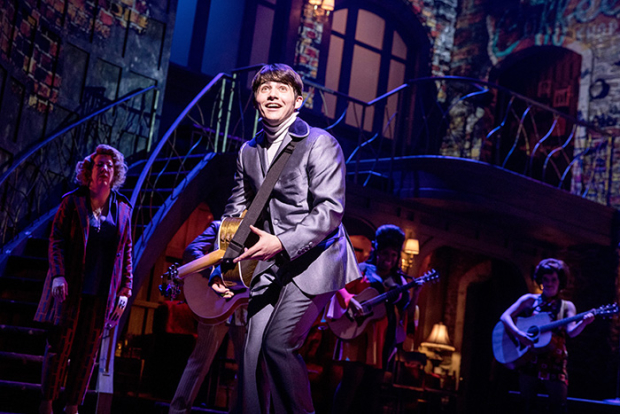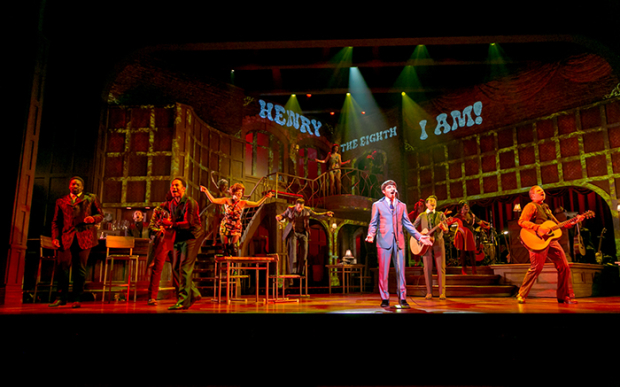My Very Own British Invasion Reimagines Peter Noone as a Fabled Hero
The Herman’s Hermits front man sings through the hits of the 1960s in this world-premiere musical at Paper Mill Playhouse.

(© Evan Zimmerman for MurphyMade)
Was the world clamoring for a Peter Noone biomusical? The answer is unclear — but also surprisingly irrelevant in light of the revelation that My Very Own British Invasion, now making its world premiere at Paper Mill Playhouse, is not a Peter Noone biomusical. Noone, the nice-boy-next-door lead singer of the 1960s British pop band Herman's Hermits, merely serves as the unlikely eye of the hurricane that was the British Invasion — more often defined by bad-boy rockers like the Beatles or the Rolling Stones. While Mick Jagger is propagating the culture of sex, drugs, and rock and roll with songs like "Let's Spend the Night Together," Peter is demurely singing "Mrs. Brown, You've Got a Lovely Daughter."
And yet, Rick Elice (a Tony-nominated book writer who has a track record of weaving compelling yarns out of jukebox musicals like Jersey Boys and The Cher Show) imagines this sweet teen as the instigator of a musical Trojan War — a journey across the sea to capture the heart of his Helen (in this case, Pamela) with nothing but simple melodies and a boyish smile.
The story that Elice fabricates for Peter is a basic love triangle, blown up to mythic proportions. The players are Peter (Jonny Amies, bursting with charisma for his professional theatrical debut); Trip (a Jagger-esque playboy performed by Conor Ryan with a powerful voice and a lot of rocker camp); and the object of both their affections, Pamela (Erika Olson, a convincingly self-possessed Madonna for these angel and devil figures).
As it turns out, it wasn't American fandom that launched a thousand British rockers. It was Pamela. Peter and Trip duke it out for her love over in Britain (the Yardbirds' "For Your Love" appropriately underscores several moments in the show), until Pamela is shipped off on an American tour by the trio's shared manager, Fallon (John Sanders playing a Machiavellian music executive who enjoys speaking in cryptic acronyms). Peter and Trip proceed to follow her overseas: Trip hopes to share a musical adventure with her in the states, while Peter wants to bring her home to save her from her new self-destructive vices (Olson channels Robin Wright's drug-induced near-suicide in Forrest Gump while joining Kyle Taylor Parker in a standout duet of the show's climactic arrangement of the Animals' "House of the Rising Sun").
Will the nice guy win the day? That's the question that has to power this epic voyage across the pond and back, but it runs out of gas somewhere in the middle of the Atlantic. I know — who could have foreseen that a romantic saga involving Peter Noone and two dreamed-up British rock stars is not compelling enough to fuel a two-act production? Nevertheless, it's not all bad news for the jukebox musical.
Despite the lackluster story, My Very Own British Invasion feels like one big 1960s dance party decorated with bold costumes by Gregg Barnes (the shiniest of sharkskin suits for Peter to contrast Trip's rock glam) and exhilarating Jerry Mitchell choreography (Mitchell both choreographs and directs with audacious fervor). The milieu proves to be far more important than the characters, and the creative team anchors this rich environment in London's Kingly Street club, Bag O' Nails — a place that tells a fascinating story of its own (and is given a beautiful two-story design by David Rockwell).
Like a British Invasion training ground (in the spirit of war metaphors), Bag O' Nails was where soon-to-be rock legends honed their craft before taking American Bandstand and The Ed Sullivan Show by storm. It's also apparently a place that was frequented by the great Roger Rees, Elice's late husband, who witnessed early private performances by icons like John Lennon and Freddie Mercury. It's no wonder that Elice paints this musical hub as an epicenter of community, creation, and love — something greater than the sum of its parts and far more meaningful than however many rounds of "I'm Henry the Eighth, I Am" its walls had to suffer through.

(© Jerry Dalia)







